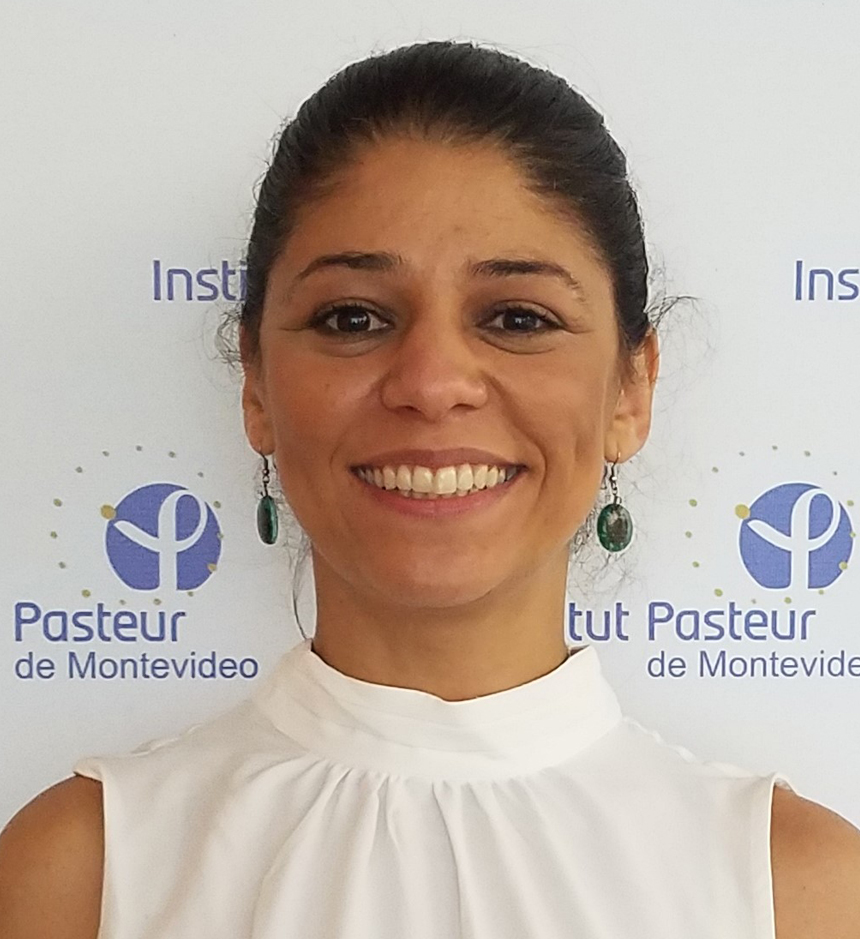Chronic Lymphoid Leukemia Research
Our laboratory focuses on the study of the mechanisms involved in the origins and progression of Chronic Lymphoid Leukemia (CLL), the most common type of leukemia in people over 50 years, whose incidence in Uruguay is 5 cases per 100,000 people. CLL originates in cells of the immune system known as B lymphocytes, which lose their ability to die and begin to accumulate in the blood. Although many patients with CLL respond to current treatments, some don’t.
The B lymphocyte is one of the most specialized cells of the immune system and is able to re-edit its DNA, thanks to the action of the cytidine deaminase (AID), an enzyme necessary to respond in the presence of different infections.
However, the mutagenic action of the AID enzyme also has its negative aspects since B lymphocytes are continually exposed to damage of their DNA. Although the control mechanisms on AID are many and redundant, they sometimes fail, and in their absence this enzyme can be overexpressed in tumour cells, causing cancer progression and / or refractoriness in its treatment.
Our advances are related to the characterization of the expression of the AID enzyme in patients with CLL, and the development of animal models to study the causes of the progression of the disease and the refractoriness in the treatment.
Members










Research lines
Characterization of the origins of the immunological microenvironment in tumour progression and its correlation with the constitutive expression of AID in progressive patients with CLL. The objective is to corroborate if the constitutive expression of the enzyme cytidine deaminase (AID) during the evolution of the disease is a key event in the progression of CLL.
Deciphering of the effect of new inhibitors of kinases and proapoptotic molecules on the proliferative subpopulations of CLL. It aims to characterize the molecular and phenotypic effects of new kinase inhibitors and the action of proapoptotic molecules in proliferating subpopulations of the tumour clone during treatment.
The S100A9 protein as a new therapeutic target in CLL. Linkage of inflammation, microenvironment and clinical evolution. We aim to deepen the knowledge of the role of inflammation in the clinical evolution of patients with CLL.
Development of an artificial binding protein (ABP) platform to generate new prognostic and treatment tools in the LLC. The objective is to create a therapeutic tool (ABP) capable of simultaneously recognizing the tumor cell and recruiting natural killer cells (NK) to destroy the tumor clone.
Courses
- First Iberoamerican meeting on Chronic Lymphocytic Leukemia. Date and place: 15-17 November 2013, Montevideo, Uruguay.
- First LatinAmerican Workshop on prognosis markers in CLL: “Fluorescence in situ hibridization (FISH) as prognosis marker in CLL”. Date and place: 26-29 May 2014, Buenos Aires, Argentina.
- Second LatinAmerican Workshop on prognosis markers in CLL: “Cytometry approaches in the prognosis of CLL”. Date and place: 16-18 November 2014, Florianopolis, Brazil.
- Third LatinAmerican Workshop on prognosis markers in CLL: “Analysis of mutational profile of immunoglobulin VH genes in CLL“. Date and place: 20-22 May 2015, Montevideo, Uruguya. Participants: 42.
- Academia de Hematología. Training course organized by AbbVie, Institut Pasteur de Montevideo and Hospital Maciel for AbbVie Staff. Three in the year 2016-2017.
Projects
2021-2023 – “Functional characterization of AID off-target mutations during leukemia progression”. ANII Grant FCE_2021. Responsible: Pablo Oppezzo.
2020-2022 – “Musashi 2 RNA-Binding Protein as a novel therapeutic target for chronic lymphocytic leukemia patients”. ANII/GSK call (FSGSK_1_2020_1_165303). Responsible: Florencia Palacios. Co-responsible: Pablo Oppezzo.
2018-2021 – Evaluación de cambios genónicos asociados con la enzima AID y su papel en la progresión tumoral de neoplasias de células B. Researchers: M.A. Navarrete y P. Oppezzo. Fondecyt N° 1180882.
2018-2020 – S100A9 as a novel target in CLL. Linking inflammation, microenvironment and clinical evolution. ANII-GSK Project.
2015-2018 – Development of Union Proteins (Afitins) for the evaluation of new prognosis and therapy techniques in Chronic Lymphoid Leukemia. Fondo María Viñas: FMV_1_2014_1_104397
2015-2017 – “Anomalous expression of Lipoprotein Lipase in Chronic Lymphocytic Leukemia: Towards the development of a new prognostic marker”. ANII Grant FMV_2015. Responsible: Pablo Oppezzo.
2012-2015 – Expression of Lipoprotein Lipase in B cells of Chronic Lymphoid Leukemia (CLL): Towards the development of a new prognostic marker. Fondo María Viñas: FMV_2_2011_1_7323
2012-2015 – Implications of the abnormal expression of the mutagenic AID enzyme in leukemic processes: Development of a tumor model. Fondo Clemente Estable: FCE_2011_7273
2011-2014 – Thematic networks – Dr. Pablo Oppezzo – “Iberoamerican network on Chronic Lymphocytic Leukemia: towards the development of new prognostic markers”. CYTED.
Main publications
vacio
2021
- Morande PE, Yan XJ, Sepulveda-Yanez JH, Seija N, Marquez ME, Sotelo NS, Abreu C, Crispo M, Fernández-Graña G, Rego N, Bois T, Methot SP, Palacios F, Remedi V, Rai KR, Buschiazzo A, Di Noia JM, Navarrete MA, Chiorazzi N, Oppezzo P*. AID overexpression leads to aggressive murine CLL and non-Ig mutations that mirror human neoplasms. Blood. 2021 Mar 2:blood.2020008654.
2019
- Ibrutinib therapy downregulates AID enzyme and proliferative fractions in chronic lymphocytic leukemia.Morande PE, Sivina M, Uriepero A, Seija N, Berca C, Fresia P, Landoni AI, Di Noia JM, Burger JA, Oppezzo P. Blood. 2019 May 9;133(19):2056-2068. doi: 10.1182/blood-2018-09-876292.
2018
- Multi-Compartment and Multi-Host Vector Suite for Recombinant Protein Expression and Purification. Ortega C, Prieto D, Abreu C, Oppezzo P, Correa A. Front Microbiol. 2018 Jun 27;9:1384. doi: 10.3389/fmicb.2018.01384. eCollection 2018.
- LPL protein in Chronic Lymphocytic Leukaemia have different origins in Mutated and Unmutated patients. Advances for a new prognostic marker in CLL. Prieto D, Seija N, Uriepero A, Souto-Padron T, Oliver C, Irigoin V, Guillermo C, Navarrete MA, Inés Landoni A, Dighiero G, Gabus R, Giordano M, Oppezzo P. Br J Haematol. 2018 Aug;182(4):521-525. doi: 10.1111/bjh.15427. Epub 2018 Jun 28.
2017
- S100-A9 protein in exosomes from chronic lymphocytic leukemia cells promotes NF-κB activity during disease progression. Prieto D, Sotelo N, Seija N, Sernbo S, Abreu C, Durán R, Gil M, Sicco E, Irigoin V, Oliver C, Landoni AI, Gabus R, Dighiero G, Oppezzo P. Blood. 2017, Aug 10;130(6):777-788. doi: 10.1182/blood-2017-02-769851.
- Noninfectious complications in patients with pediatric-onset common variable immunodeficiency correlated with defects in somatic hypermutation but not in class-switch recombination. Almejún MB, Campos BC, Patiño V, Galicchio M, Zelazko M, Oleastro M, Oppezzo P, Danielian S. J Allergy Clin Immunol. 2017, Mar;139(3):913-922. doi: 10.1016/j.jaci.2016.08.030.
2015
- Activation of the PI3K/AKT pathway by microRNA-22 results in CLL B-cell proliferation. Palacios F, Abreu C, Prieto D, Morande P, Ruiz S, Fernández-Calero T, Naya H, Libisch G, Robello C, Landoni AI, Gabus R, Dighiero G, Oppezzo P. Leukemia. 2015, Jan;29(1):115-25. doi: 10.1038/leu.2014.158.
2013
- «Role of the B-cell receptor and the microenvironment in chronic lymphocytic leukemia». Oppezzo P, Dighiero G. Blood Cancer J. 2013, Sep 20;3:e149. doi: 10.1038/bcj.2013.45.
- Lipoprotein lipase expression in unmutated CLL patients is the consequence of a demethylation process induced by the microenvironment. Moreno P, Abreu C, Borge M, Palacios F, Morande P, Pegazzano M, Bianchi S, Landoni AI, Agrelo R, Giordano M, Dighiero G, Gamberale R, Oppezzo P. Leukemia. 2013, Mar;27(3):721-5. doi: 10.1038/leu.2012.212.
2010
- High expression of AID and active class switch recombination might account for a more aggressive disease in unmutated CLL patients: link with an activated microenvironment in CLL disease. Palacios F, Moreno P, Morande P, Abreu C, Correa A, Porro V, Landoni AI, Gabus R, Giordano M, Dighiero G, Pritsch O, Oppezzo P. Blood. 2010, Jun 3;115(22):4488-96. doi: 10.1182/blood-2009-12-257758.
